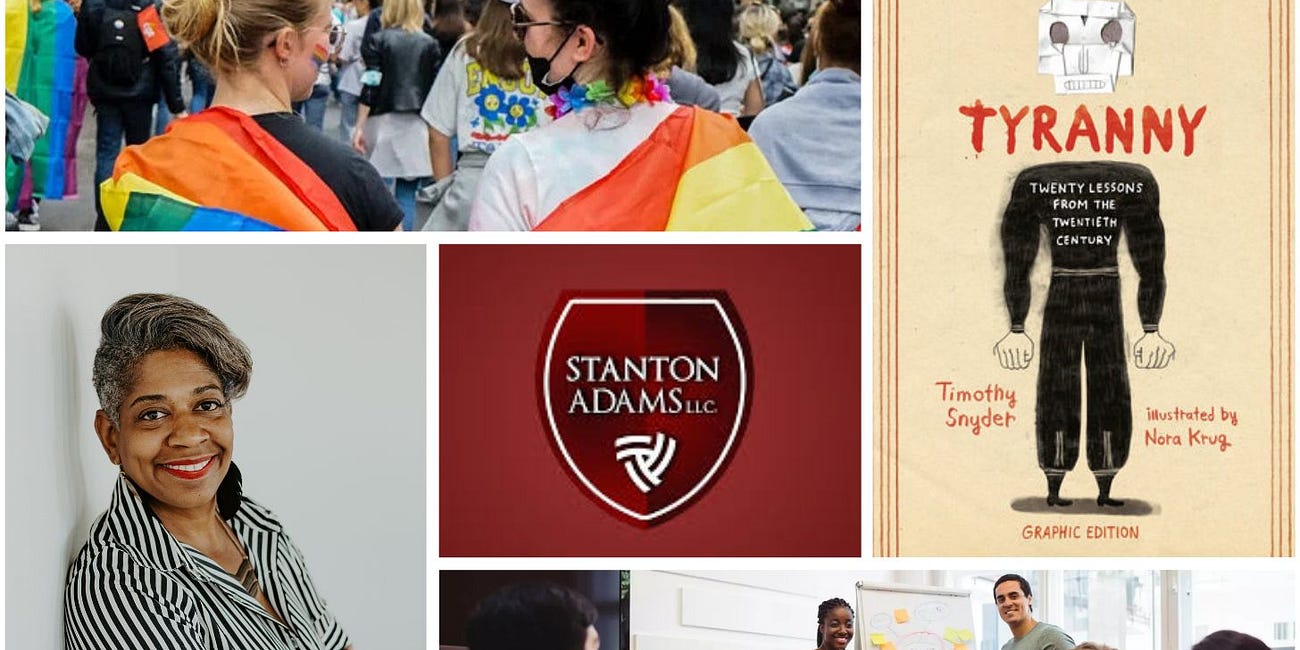What the Barefoot Contessa Taught Me About Feminism (Issue #93)
From the White House to the kitchen, Ina Garten’s journey offers an important lesson for all of us.
Note: Links preceded by an asterisk (*) are affiliate links that allow me to collect a small commission when you purchase something I’ve recommended. That said, I can promise I’ll only ever share items I love. Buying through these links is one way to support me and my small biz.
Hi friends!
I was excited about Ina Garten’s memoir even before it even hit shelves. I’ve never followed her career closely, but when the buzz about *Be Ready When the Luck Happens made its way through my online circle, I wanted to know more. So, I clicked play on the audiobook narrated by Ina herself (s/o Libby) and took a journey through her world.
Ina is probably best known for her Food Network TV show, The Barefoot Contessa, a monicker she first gained after she purchased a gourmet food store of the same name. With thirteen cookbooks accounting for more than 13 million copies in print, it’s safe to say that Ina has built a massively successful culinary empire. I knew some of these highlights, but in the story of her life, these details are woven alongside a vulnerable portrait of a young woman trying to find her place in the world at a time when girls were expected to do little more than grow up and keep house.
In describing her youth and young adulthood, Ina isn’t shy about her weaknesses. But where she sees her own shortcomings, she offers glowing praise for her husband, Jeffrey — not just in a ‘better-half’ kind of way, but in a ‘he took care of me’ kind of way. She mentions receiving an allowance from him and even credits him with ‘raising her’ given her tumultuous relationship with her parents. Comparing these descriptions to her incredibly successful career, I found it striking — how could someone so accomplished be so self-critical yet so deferential to her husband?
And then it hit me – Ina Garten came of age when women’s rights looked very different than they do now. You can feel this difference in her writing. She spent her early 20s in the late '60s and early '70s, an era with vastly different expectations for young women.
The timing of today’s issue is intentional. March is Women’s History Month — a celebration that, this year, is under direct attack by the current administration. As I read Ina Garten’s memoir, I wondered why I hadn’t more seriously considered the perspectives of women from her generation before now.
I’ve always known that women’s rights were hard fought and won, and I think most millennial women have grown up with at least a vague awareness that the life we live now isn’t to be taken for granted. But reading a memoir from someone who really lived it, especially one who is still alive, made the contrast more striking.
Partway through the book, I was chatting with my husband, Andrew, and he pointed out that it wasn’t until 1974 that women could even apply for and own a credit card in their name. My mom was born just one year before this change. You don’t have to look very far back to find a time when the material realities of women were tangibly different than they are today.
Shortly after my chat with Andrew, Ina discussed her and her husband’s attempt to buy their first home. Despite both holding stable, respected jobs at the White House, they were told they wouldn’t qualify for a loan. The reason? The bank refused to consider Ina’s income. In their logic, Ina would inevitably quit her job to have children, so her paycheck was unreliable. Her protests were met with more dismissals. “You don’t exist on paper, anyway,” they said since all their credit cards had been in Jeffrey’s name. Frustrated, Ina went home and immediately transferred all the credit cards she and her husband used into her name. She has a good sense of humor about the whole ordeal, writing, “Poor Jeffrey, he didn’t exist after that.”
This was the Ina that made sense to me. Headstrong and determined. Traits that seem essential to leading a career as successful as hers. But I struggled to reconcile this version of Ina with the version that would go on to continually insist that her husband “raised her.” There was a tension there that I only really began to understand as she described the listlessness of her late 20s. She had built a successful career at the White House but still felt haunted by lingering doubts that her life wasn’t as fulfilling as she hoped. She felt directionless — no longer interested in her current job, but also lacking passion in a broader sense.
Then, Ina found a book, revolutionary for its time, that really shifted her worldview. The book focused on women of her generation, those born in the 1940s, forced to come of age at a time when examples of successful professional women in popular media and culture were few and far between. Without a pre-existing path to map their lives onto, the book argued, these women were almost forced to pin their aspirations onto some kind of male role model. Reading, Ina saw herself as one of these women. She realized she’d done exactly what the book described, following in Jeffrey’s footsteps instead of trudging out her own path. He went to college, so she went to college. He got a job at the White House, and she followed suit.
It was a passage I found particularly eye-opening. Of course, there are incredible women throughout history who’ve done amazing, interesting, and innovative things with their lives. Still, it would be a lie to say every woman throughout history has been able to realize her full potential. As a Black woman mostly raised in Minnesota, I can partially relate to Ina’s persepctive. Professionally, I’ve often been the only Black person in the room — sometimes the only person of color at all. When I became a photographer, I struggled to find local Black entrepreneurs or business owners, let alone a wedding photographer, whose experience I could model my own path after.
Luckily, I was raised by the incomparable Cecilia Stanton Adams, a woman who has managed to grow a successful business while also being the best mommy in the world!!! And growing up, my mom was really intentional in showing me that people like us have innumerable paths to success. And that’s the difference between being born in 1948 and 1995. Things still aren’t perfect, but it’s hard to say they aren’t better.
Still, without any models, Ina found her path and built a career doing the things American culture has traditionally viewed as less valuable. Things considered “women’s work,” like hosting, cooking, and entertaining. And Ina didn’t just make a living doing these things – she built an empire!
I’m not bringing up Ina’s memoir just to give her flowers (although celebrating her success is well-deserved). I’m bringing it up to say this history, the struggles Ina faced based on her gender, it’s recent history. According to the ACLU, the U.S. Supreme Court didn’t invalidate any laws that discriminated on the basis of sex until *1971*. It wasn’t until 1975 that the same court found a state regulation barring pregnant women from unemployment compensation to be unconstitutional. And those are just a few examples. The work continues, especially when considering the experiences of Black women, Indigenous women, and other women of color. In fact, it wasn’t until 2019 that California became the first state to pass the CROWN Act, the first legislation to protect against hair-based discrimination in work and school environments. Today, 25 states have adopted the law, which means the other half still offer no legal protections.
Which brings me to the current political moment. It is no secret that the Trump administration poses a profound threat to the rights and autonomy of women nationwide. It’s why it can be illuminating to examine how far we’ve come and to remind ourselves of the urgency to fight to protect these rights. To stand up and make sure we never go back.
A round-up of things to watch, read, and listen to as you head into the weekend.
The Best Restaurants in the Twin Cities by Stephanie March and Dara Moskowitz Grumdahl
The next best thing to eating out is finding a list of places to check out next.
Down The Rabbit Hole Podcast: Food, Glorious Food, with Katherine Rundell and Kate Young
This episode ventures through the food worlds of iconic children’s literature!
IEEE Spectrum: This Socialite Hated Washing Dishes So Much That She Invented the Automated Dishwasher by Joanna Goodrich
I fell down a dishwasher research rabbit hole and was amazed to dive into its 175-year history. Trying to avoid the chips in her china plates that often came from handwashing, Josephine Cochran invented the first machine to use water pressure to clean dishes. I love my dishwasher and honor its origins, haha!
After countless requests, Truer Crime's first-ever merchandise has officially launched! This limited-edition t-shirt isn’t just a merch item—it’s a conversation starter, community badge, and direct support for the future of Truer Crime. But act fast—this isn't a permanent offer. When they're gone, they're gone for good. Visit here to claim yours before they sell out.
This week on the podcast, we’re diving deep into the story of Sonya Ivanoff:
Sonya Ivanoff was a rising star in Alaska’s small, tight-knit community. A talented basketball player with dreams of a college career, she had her whole future ahead of her—until she was found murdered at just 19 years old. In the isolated town of Nome, investigators were left with few clues and fewer answers, as the case spiraled into a labyrinth of conflicting leads. In today’s episode, we explore the haunting mystery behind Sonya’s death and the unsettling questions it raises about power and justice in America.
You can listen to this episode and more on Spotify, Apple Podcasts, or by searching “Truer Crime” wherever you get your podcasts.
Things to try + share in the group chat.
I bought Andrew *this French press coffee maker for Christmas, and as a result, we’ve been getting very into making the perfect cup of coffee. We’ve been French press users for a while, but I recently learned that this and other unfiltered brewing methods can raise LDL cholesterol levels! Enter a flurry of research and my purchase of *these paper coffee filters. Not only are they better for our health, but they really improve the taste! We’ve found our coffee is noticeably smoother and less bitter. To raise the bar even further, we also invested in *this electric milk frother, which lets you set the froth level you want, and it will automatically turn off once it’s done heating!!
The perfect meal for a busy weeknight, this One-Pot Tortellini with Prosciutto and Peas (gift link) comes together incredibly fast! I used Trader Joe’s cheese tortellini to keep things simple, and it was *delicious* :)
Before you go, be sure to check out last Friday’s issue. DEI isn’t failing—it’s being targeted. My mom, a DEI expert with 20+ years of experience, explains why this moment is so critical and what we can do to fight back:
And then on Monday, I shared the food, TV, products, and reels that got me through February:
Thanks for being here, and have a great weekend!
Want to stay connected between now and next Friday? Don’t be a stranger!! Make sure to follow me on Instagram and TikTok. Know someone who you think would like Sincerely, Celisia? It would mean the world if you could help spread the word by sharing this newsletter through the button below!! <3










